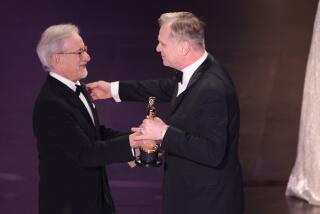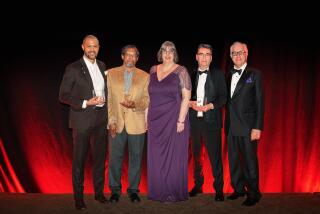Oscars 2015: ‘The Imitation Game’ wins for adapted screenplay

“The Imitation Game,” the story of how mathematician Alan Turing broke Nazi Germany’s Enigma code to help win World War II, has won the Academy Award for adapted screenplay.
Accepting the award, screenwriter Graham Moore, a first-time Oscar nominee, said, “Alan Turing never got to stand on a stage like this and look out at all of these disconcertingly attractive faces and I do – and that’s the most unfair thing I think I’ve ever heard.”
FULL COVERAGE: Oscars 2015
He took that opportunity to say, “When I was 16 years old, I tried to kill myself because I felt weird and I felt different and I felt like I did not belong – and now I’m standing here. So I would like for this moment to be for that kid out there who feels like she’s weird or she’s different or she doesn’t fit in anywhere. Yes, you do. I promise you do. Stay weird, stay different, and then when it’s your turn and you are standing on this stage, please pass the same message to the next person who comes along.”
In what had widely been seen as a close and hard-to-predict race, “The Imitation Game” beat out the music school psychodrama “Whiplash,” the Iraq war movie “American Sniper,” the Thomas Pynchon adaptation “Inherent Vice” and the Stephen Hawking biopic “The Theory of Everything.”
Earlier this month, “The Imitation Game” took home the adapted screenplay award at the Writers Guild Awards, considered a significant bellwether for the Academy Awards.
Moore wrote in The Times last year that, as a self-described misfit, he connected deeply with Turing’s story.
OSCARS 2015: Complete list | Top nominees | Red carpet blog | Live updates | Red carpet photos
“Alan Turing was an outsider’s outsider — perhaps the most brilliant scientist of his generation, a social outcast who produced theories decades ahead of their time. A gay man who was able to keep secrets for the government so well precisely because he’d been forced to spend his entire life keeping his sexuality secret from a world in which a kiss between two men was literally punishable by two years in prison,” Moore wrote.
“For a weird kid like myself, who never felt like he belonged or fit in, Alan Turing wasn’t just an inspiration — he was a patron saint.”
Moore’s screenplay was based loosely on author Andrew Hodges’ biography of Turing, “Alan Turing: The Enigma.”
More to Read
Only good movies
Get the Indie Focus newsletter, Mark Olsen's weekly guide to the world of cinema.
You may occasionally receive promotional content from the Los Angeles Times.











